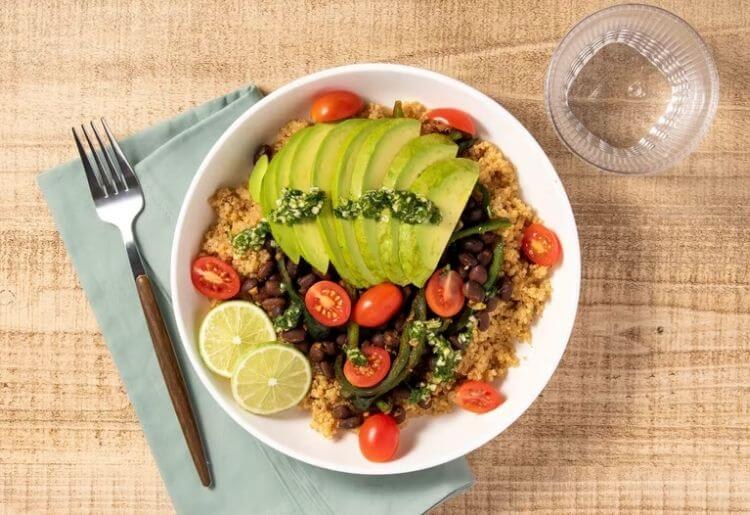If you ever feel hungry, but you’re too exhausted to prepare yourself a healthy meal, you’re not alone. While the temptation increases to just get take-out or to hit the nearest drive-thru, so does the guilt about feeding your family yet another low-quality, low-nutrient meal.
Fortunately, you live in a time where you can lean on meal delivery services that take the guesswork out of meal planning and prep while offering a variety of foods that your whole family will enjoy.
Meal delivery services can provide nutrient-rich foods that you wouldn’t get otherwise from your soggy take-out or greasy drive-thru meal.
Nutrient-rich food sources
Many people fall short of the average daily requirements of important nutrients. The typical American diet contains many processed and convenience foods that are high in salt, fat, and sugar but are lacking in adequate fiber and key vitamins and minerals.
Try eating a wide variety of whole foods like fruits, vegetables, whole grains, beans, nuts, and seeds to ensure your body is getting what it needs to work optimally.
Nutrient
Food sources
Fiber
Beans, whole grain bread, quinoa, brown rice, whole grain cereal, apples, pears, and berries
Potassium
Sweet potatoes, white potatoes, bananas, peaches, cantaloupe, white beans, and soybeans
Magnesium
Pumpkin, beans, spinach, bran cereal, and almonds
Vitamin C
Oranges, kiwi, berries, guava, sweet peppers, tomatoes, and broccoli
Vitamin A
Liver, Swiss chard, sweet potatoes, carrots, eggs, pumpkin, and spinach
Vitamin D
Fatty fish, fortified milk, fortified orange juice, fortified yogurt, and fortified cereal
Vitamin E
Avocados, sunflower seeds, almonds, hazelnuts, almond oil
Calcium
Milk, milk-alternatives, cheese, yogurt, broccoli, dark leafy vegetables, and sardines
Here are the top 10 nutrient-rich foods to add to your diet to support your health and wellbeing.
Salmon
Salmon tops our list as one of the best nutrient-rich foods on earth. This fatty fish provides an excellent source of protein and is also chock-full of essential omega-3 fatty acids. Research shows that including two servings of fatty fish per week, like omega-3 rich salmon, can help support your heart health. Additionally, salmon has also been linked with supporting your brain health.
One recent study found that fatty fish consumption may enhance memory performance, improve brain function, and protect brain structure in healthy adults.
Salmon contains far less saturated fat than many other protein sources making it an excellent choice for people who may be watching their waistlines. Additionally, salmon is also a good source of vitamins and minerals, including magnesium, selenium, and is also abundant in vitamins B-12 and D.
Tired of shopping for fresh seafood but want to ensure you’re adding salmon to your nutrient-rich diet? HelloFresh offers pescatarian meal kits that include fresh salmon along with farm-fresh produce and whole grains, making an effortlessly balanced meal.
Quinoa
This super grain from South America has become a popular alternative to rice and pasta due to its versatility and mild flavor. Quinoa is a wonderful source of whole grain carbohydrates that will provide sustained energy throughout the day without the dreaded crash you may experience after eating simple or refined carbohydrates. The grain also provides plenty of protein and fiber, both of which can help you feel fuller for longer.
Adding nutrient-rich foods like quinoa into your diet can also provide benefits to the healthy bacteria in your gut which will in turn, help support your digestive health. You may be surprised to know that quinoa contains several plant compounds that can act as antioxidants in your body. Antioxidants can help protect every cell in your body from damage caused by unstable molecules called free radicals.
Not sure how to incorporate quinoa into a meal? Sunbasket is a meal delivery service that delivers organic ingredients with simple-to-make recipes straight to your door. It’s known for its fresh and flavorful cuisine and has plenty of recipes with quinoa for both the experienced and novice chef.
Sweet potatoes
Sweet potatoes provide an excellent source of fiber, vitamins, minerals, and antioxidants which will all go a long way in supporting your health and wellbeing.
These complex carbohydrates take longer to break down than simple carbohydrates, making them an ideal source of lasting energy. Sweet potatoes are loaded with beta-carotene, the antioxidant that gives them their notorious bright orange color. Your body converts beta-carotene into vitamin A which helps enhance your eye health.
In addition to beta-carotene, sweet potatoes also provide an abundance of vitamin C. Vitamin C comes with a wide range of health benefits including boosting your immune system, enhancing the health of your skin, and helping your body absorb important nutrients like iron.
If you’re looking to add more sweet potatoes into your diet but don’t know where to begin, look no further than EveryPlate’s meal delivery service. EveryPlate offers budget-friendly, easy-to-follow, simple recipes with your favorite comfort foods including sweet potatoes.
Broccoli
Broccoli, a cruciferous vegetable, is one of the most nutrient-dense foods, supplying your body with a wonderful mix of vitamins, minerals, and antioxidants.
These unsuspecting green little trees are also high in fiber. In fact, one cup of broccoli has 2 grams of fiber which is almost 10% of your daily recommended value. This very low-calorie vegetable is surprisingly high in protein compared to other vegetables, as one cup of broccoli provides roughly 2 grams of protein.
Broccoli is also rich in sulforaphane which is a sulfur-rich compound found in a variety of cruciferous vegetables. Research suggests that consuming a diet rich in sulforaphane may be protective against different types of cancer.
Swiss Chard
Swiss chard is a leafy green with colorful stems and is considered a member of the beet family. This leafy green is teeming with vitamin K and vitamin A. Additionally, Swiss chard provides iron and vitamin C, both of which support healthy skin, and blood vessels.
Moreover, Swiss chard contains the minerals calcium, magnesium, and potassium which are known to support healthy blood pressure. These important minerals can reduce blood pressure by dispersing sodium out of the body which can help your arteries dilate.
Beans
While there are many different types of beans to choose from, some of the most popular include black beans, navy beans, kidney beans, lima beans, soybeans, pinto beans, and garbanzo beans, also known as chickpeas.
Beans make an excellent low-calorie, low-fat source of protein compared to other protein sources, like meat and dairy products. Also, if you’re like most Americans, and aren’t meeting the recommended 25 to 38 grams of fiber each day, you may want to include more beans into your diet.
A diet rich in fiber is associated with many health benefits including lowering cholesterol and high blood pressure, supporting gut health, and helping you feel fuller for longer, which prevents overeating and hunger between meals.
 Cuban-Style Avocado Black Bean Quinoa Bowl by Home Chef
Cuban-Style Avocado Black Bean Quinoa Bowl by Home ChefAvocado
Believe it or not, avocados are technically a type of berry that are native to Mexico and Central America, but they are now grown in many areas of the world. Avocados are one of the most nutrient-dense foods on the planet and have been linked to a wide variety of health benefits.
They contain an impressive amount of heart-healthy monounsaturated fat which may help reduce heart inflammation. Additionally, avocados provide beta-sitosterol, the plant version of cholesterol known to help lower cholesterol levels within the body. Avocados are packed with potassium and magnesium, two nutrients that are essential to keeping your blood pressure at a healthy level.
Home Chef is another meal delivery service which offers nutrient-rich meals such as their Cuban-Style Avocado Black Bean Quinoa Bowl.
Garlic
Garlic is known for adding delicious flavor to your meals, but the benefits don’t end there. The use of garlic as a medicinal plant dates back to ancient times when Greek physician Hippocrates prescribed garlic to treat a variety of health conditions.
Garlic gets its powerful odor from an organic sulfur compound called allicin, which is the source of many of its health benefits. The compound allicin has been associated with protecting against blood vessel damage caused by high blood pressure, blood sugar, and cholesterol. Additionally, recent studies suggest that allicin and other compounds found in garlic may protect against some cancers while keeping cancer cells from multiplying.
Blueberries
This wildly popular berry has a superb reputation, and for good reason. Often considered a superfood, these little berries pack a mighty punch of nutrient density. Not only are they loaded with vitamin C, vitamin K, fiber, and manganese, they are known to have one of the highest antioxidant levels compared to all other fruits and vegetables. Antioxidants are important compounds that can help prevent and repair the stress that comes from cell oxidation. Oxidation is a natural process that occurs as we age and can lead to a variety of chronic diseases.
Eggs
Eggs can fit nicely in a nutrient-rich diet as they contain 6 grams of high-quality protein without loading you down with saturated fat. A diet rich in protein can help support weight management, improve bone health, and increase muscle mass.
Besides containing a nice variety of vitamins and minerals to support your health, eggs also contain two powerful antioxidants: lutein and zeaxanthin. Lutein and zeaxanthin can gather in the retina and protect against eye disorders like cataracts and macular degeneration.
Eating a Nutrient-Rich Diet
Nutrient-rich foods often contain a variety of vitamins, minerals, complex carbohydrates, high-quality protein, healthy fats, and antioxidants. From salmon to blueberries, there’s no shortage of healthy foods to choose from that contain a wide assortment of important nutrients.
If meal planning, shopping, and meal prepping feel overwhelming, there are plenty of meal kit delivery services that will provide a balance of nutrient-dense foods that will meet your diet preferences and nutritional needs.
Eating nutrient-rich foods will ensure you are getting what your body needs to support optimal health and wellbeing without excess sugar and fat often found in convenience foods.

